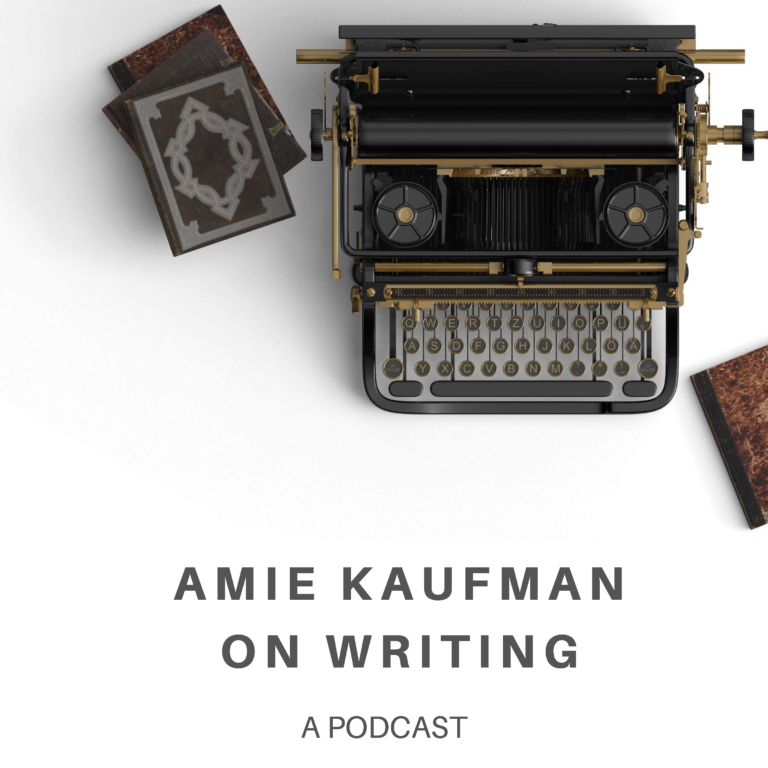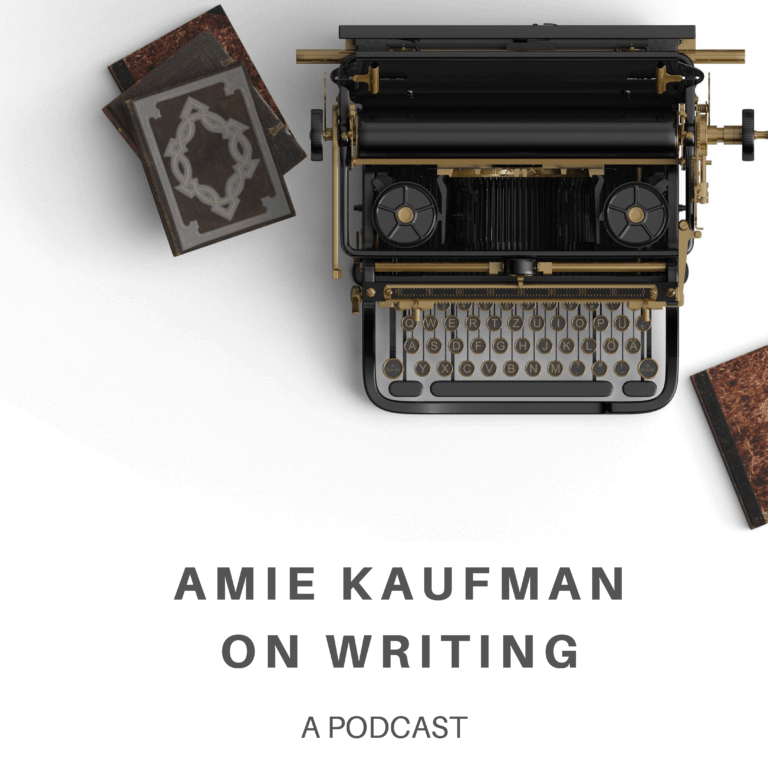Episode 6: Crafting Distinctive Character Voices

New York Times and internationally bestselling author Amie Kaufman answers one question each week about writing craft. Full of practical tips and an exercise each week, this is a show for writers, for readers who want a backstage look at how their favourite authors craft their stories, or for creative writing classrooms.
You can find a transcript of this episode at my website, where you can also subscribe to my newsletter, get behind-the-scenes peeks at how I write, and any other news about new books, events or the podcast. You can also submit a question for the podcast on my website. You can find me on Twitter or Instagram.

FOLLOW ON APPLE PODCASTS . FOLLOW ON SPOTIFY . FOLLOW ON OVERCAST . FOLLOW ON PODCAST ADDICT
Season 2, Episode 6: Crafting Distinctive Character Voices
Hi, my friends.
Welcome to Amie Kaufman on Writing, a short podcast that answers one question each week about how writers do what they do.
If you’re a writer, or you’re a reader interested in how your favourite authors craft their stories, then you’re in the right place.
This is Season 2, Episode 6: Crafting Distinctive Character Voices.
Here’s my friend and producer Kate with this week’s question. Hi Kate, how are you?
Hi Amie, I’m good!
This week’s question is from Nayara, who says: Do you have any tips on how to make the characters’ voices sound different? Sometimes while I’m writing I have the impression that my own voice is louder than the characters, or that all of the characters seem to be the same person.
I picked this question out of my mailbag because it’s one of my specialties. I love writing large casts of characters, and getting their voices right is key.
Now, when we say “voice” we can mean a few different things. We can mean the author’s voice – that is, the qualities to their writing that mean you always know who you’re reading. For example, I could read a book by Laini Taylor or Garth Nix with the cover removed, and I’d still know who wrote it.
But another thing we can mean when we say “voice” is that same quality in the characters themselves – and that’s what we’re talking about today. Nailing your characters’ voices is important for so many reasons – and even more so if you’ve got a large cast, or multiple points of views.
On a purely practical basis, it’s important that we know who’s speaking, but it goes well beyond that. A character’s voice helps us get to know who they are. And once we know that—know their personality, their quirks—then we know when something’s wrong, or something’s up, or even what they’re thinking, just as we would with one of our friends in real life. Those small differences start to mean something.
There are two different parts to getting character voice right – who they are, and what they say. Let’s start off with who they are.
Whether you’re doing this before you write—because you like to figure things out and outline—or when you’re editing and searching for a more distinct voice for each character—figuring out who this person really is will help you know what makes them distinctive.
Think about their point of view on the world—what have their life experiences been, and how does that drive the way they speak, behave and respond? How are they different to the other characters around them?
Here’s an example – in my book Illuminae, we meet Kady and Ezra. Ezra’s a jock with a heart of gold, and Kady’s a hacker with authority issues. They’ve got different personalities and have had different life experiences, and that means they respond to their shared experiences in different ways. When they’re caught in an emergency situation, they have different instincts telling them to comply with instructions, or challenge authority—that shows up in everything from their behavior to their thought processes to their speech patterns.
Another example is the character of Finian, from Aurora Rising. He’s had a tough time in the past, sent to live away from his family, encountering discrimination. He says things to needle people—he’s always on the defensive, ready to deflect, and that shows up in the things he chooses to say, and the way he says them.
Think about your characters, and their personalities. A leader might speak more often, and a follower might speak less, or only to particular people. Someone who’s defiant might interrupt, and someone who’s lacking in confidence might wait until everyone else has spoken before they venture an opinion.
Now you know this, ask yourself what kind of situation might change that behavior. Ask yourself more questions about their world, and the way they’ve lived in it. Are they educated? Wealthy? Or does their world have distinctive features that influence how they perceive things?
For an example of your world shaping your voice, let’s look at The Other Side of the Sky, where we meet Prince North. He’s lived all his life on an island suspended in the sky. There are no animals there, but his people do have birds, and flight obviously plays a large part in their world. So you see his life experience impact the way he perceives the world, and then the way he describes it. When he wants to try a plan, he’ll say “Well, it’s time for this thing to flap, and see if it can fly.”
Who he is impacts the way he speaks, and then the way he speaks tells us who he is. It is, as North might say, a chicken and egg situation.
So we’ve covered a bit of the “who they are” part of the equation. Now let’s look more at the “what they say” piece – now we’re talking about vocab, about the nitty gritty.
Remember Kady and Ezra, the hacker and the jock? Well, they have different vocabularies, they use different metaphors. Those details help readers learn who they are and what they’re like, but also help readers know instinctively whose point of view they’re in.
The “what they say” part of the equation deals in turns of phrase, sentence length, vocabulary, metaphors, and so on. Did you decide your character was educated? Give them a large vocabulary. Did you decide they love music? Reflect that in the way they describe things, talking about the rhythm of a train as it passes by. Did you decide they’re shy, or gruff? Short sentences!
In The Other Side of the Sky, we have Prince North, who I just mentioned—he’s from a high tech city in the sky—and his counterpart, Nimh, who’s a living goddess in the world below, which is ruled by magic and prophecy. North speaks close to the way you or I would—he uses contractions like ‘can’t’ or ‘don’t’, he uses slang, he cracks jokes.
Nimh was raised in a formal environment in the temple, and her word choices help us get to know more about who she is. No contractions for Nimh—she says ‘cannot’ and ‘does not’ instead . . . except when she’s feeling very deeply, and slips to something more informal. And when that happens, we learn something about her without the text needing to spell it out.
Now, there are a couple more things to consider when it comes to the mechanics of a character’s voice.
The first is spelling out an accent, or a dialect. It’s not impossible to do, but my advice is to be very thoughtful about how you approach it – leaving aside the fact that it’s often harder for the reader to read, it also puts you at risk of slipping into stereotypes, either offensive or just lazy. You can achieve so much just with your vocabulary choices, with whether the character speaks a lot or a little, whether they’re rough or gruff or hoarse or prim.
The final thing to watch out for in all of this is your own voice—this week’s question insightfully pointed out that sometimes our own authorial voice can be louder than that of the characters. For example, I have a habit of leaving the “ly” off words. This morning I wrote this sentence, from a particular point of view: “Dante simply watches, quiet.” So I’m saying “Dante simply watches – comma – quiet.”
Another, more common way of saying this would be “Dante simply watches quietly.” So no comma – “quietly” instead of “quiet.”
This is just one of my turns of phrase, and though it occasionally makes my copy editors grind their teeth, it’s fine. But because it’s a little bit distinctive, I want to keep an eye on it, and make sure all my characters don’t use it. Whatever it is that you do a lot, make sure you keep it out of some people’s points of view – it’ll help set them apart from each other.
So, those are two very different places to start when you want to make sure each of your cast members have a distinct voice – who they are, and what they say.
Think about the many aspects of who they are, and how that would impact their voice, and then think about their voice itself – from their tone to their turns of phrase. And remember it’s okay to let this stuff evolve, and to find characters’ voices in revisions, as you get to know them more.
Here’s an exercise: Sit back next time you see a bunch of people talking—whether it’s a meeting at work, a family dinner, or a TV show you’re watching. Note the differences in the way each person expresses themselves, and think about how they came to be – for bonus points, ask yourself how different these people might sound if they were in different situations, perhaps more formal, or with people they do or don’t know.
That’s all for this week. Next week, I’ll be answering a question about weaving in backstory – but avoiding info dumps.
In the meantime, I’ll remind you to subscribe, and leave the podcast a review wherever you listen. Both these things help new listeners find the podcast, and I really appreciate it.
You can find me at my website, which is at amiekaufman.com – you can subscribe to my newsletter there, for behind-the-scenes peeks at how I write, and any other news about new books, events or the podcast. You can also submit a question for the podcast on my website. You can find me on Instagram at @AmieKaufmanAuthor or on Twitter at @AmieKaufman. This podcast is produced by the lovely Kate Armstrong, host of one of my favourite podcasts, The Exploress, which time travels through women’s history one era at a time. You can find her at theexploresspodcast.com.
For now, thanks so much for listening – enjoy your reading, and enjoy your writing.
Have a Question?
You can submit your question using the form using the form on the main podcast page — if you’re stuck on one aspect of your work, or you’re wondering how your favourite author pulled something off, we’d love to hear from you!
